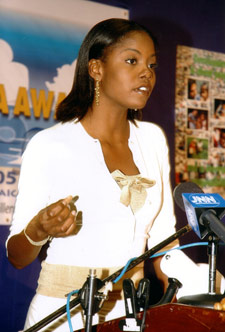Press release
Jamaican Journalists Sweep UNFPA Media Awards
09 December 2005KINGSTON, Jamaica — Jamaica's press has dominated the 2005 UNFPA Caribbean Media Awards, which had "Gender Equality, Reproductive Health and the Millennium Development Goals" as its main theme. Jamaican reporters received four of the six awards presented in radio, print and television categories, while their colleagues from Suriname and Trinidad and Tobago secured the remaining honours. The awards were presented during a ceremony that was organized by UNFPA here on 6 December.

Jamaican journalists came first in the radio category of the competition, with Damion Mitchell, of POWER 106 FM, winning the top platinum award for an entry entitled "Murderous Rage", the harrowing story of a woman and her three children who were savaged and mutilated by the man who should have been their protector. IRIE FM's Sonja Simms took the runner-up gold prize for her feature on "Prostitution in Jamaica".
In the print category, Eulalee Thompson of the Jamaica Gleaner received the platinum award for "It's your Health, Take Control" / "Sex, Gender and HIV/AIDS", a series that ran in August and September as part of the paper's year-long health campaign. Cedriann Martin of the Trinidad Express received a gold award for “Teen Sex”, a five-part series on adolescent reproductive health and rights.
In the television category, Sharda Ganga of Stichting Projekta, a Surinamese non-governmental organization working on sustainable human development, won the platinum prize for her production, "Wan Lobi Tori, A Love Story", which uses a Romeo and Juliet-style love story to address issues of stigma, discrimination and living with HIV. Carol Francis, of Television Jamaica, received the gold for producing a series focusing on HIV/AIDS in women and teenagers, which got people to see the person first, not the disease.
The Caribbean may be a region with strong taboos, but the entries to this competition showed that there is a strong and irrepressible corps of journalists prepared to combat those prejudices with vigour and professional attitude.
Participating journalists examined some aspects of Caribbean society that many ignore. Their stories revolved around how traditional views of gender status and roles can reinforce poverty and illiteracy to generate a cycle of economically enforced prostitution on the streets and physical abuse, violence, and even murder, at home.
While congratulating journalists on the quality of submissions received, Harold Robinson, the Kingston-based UNFPA Representative for the English- and Dutch-speaking Caribbean, said, "UNFPA intends to continue to offer support to our media partners in the important role that they are playing in highlighting and helping our people to understand their sexual and reproductive health and reproductive rights, including those relating to gender equality.
* * *
UNFPA, the United Nations Population Fund, is an international development agency that promotes the right of every woman, man and child to enjoy a life of health and equal opportunity. UNFPA supports countries in using population data for policies and programmes to reduce poverty and to ensure that every pregnancy is wanted, every birth is safe, every young person is free of HIV/AIDS, and every girl and woman is treated with dignity and respect.
Contact Information:
UNFPA Jamaica: Althea Buchanan, + 1 876 906-8591, buchanan@unfpa.org
New York: Omar Gharzeddine, +1 212-297-5028, gharzeddine@unfpa.org